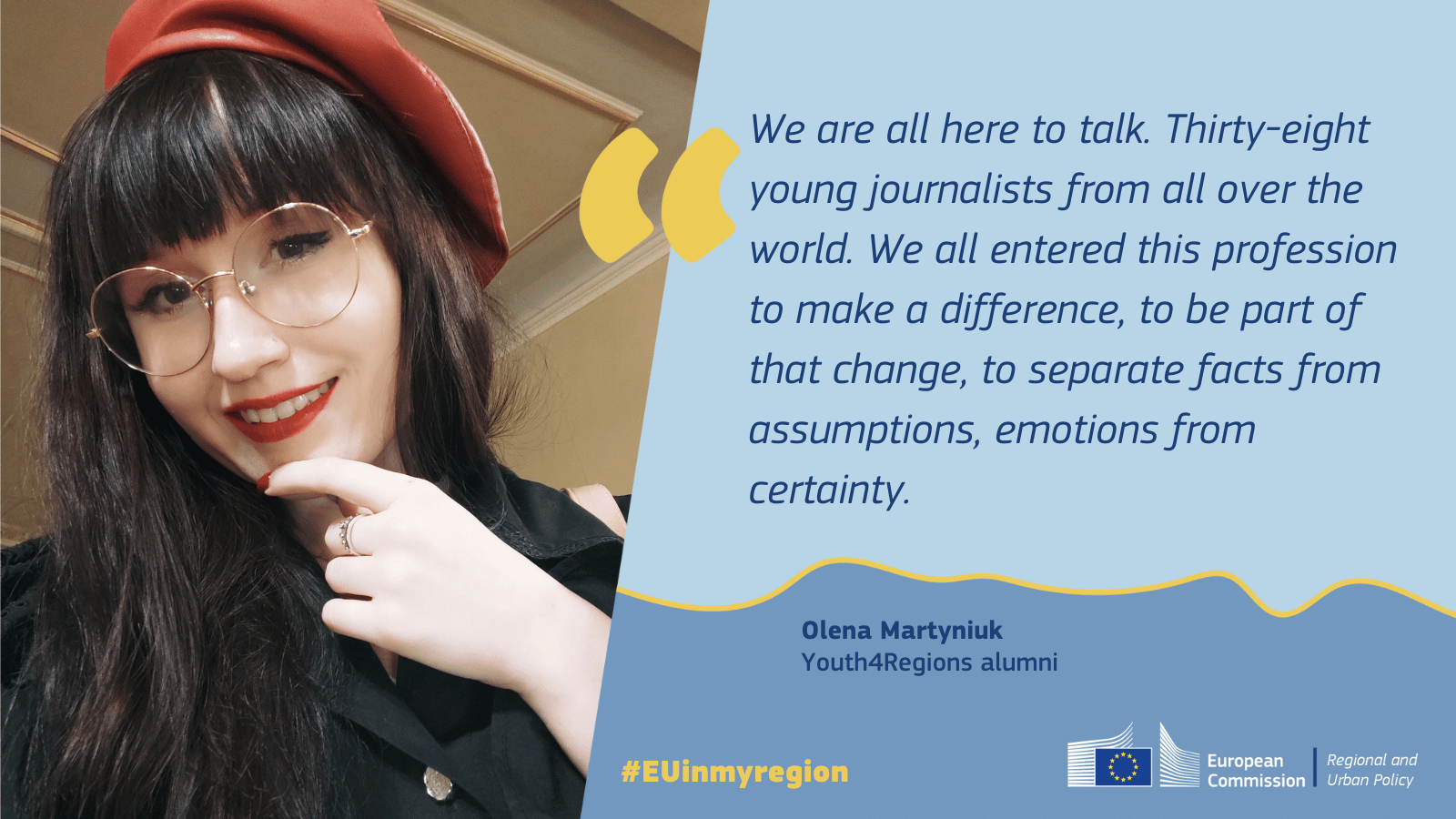
Youth4Regions, the programme for aspiring journalists, began in Brussels during the 21st edition of the European Week of Regions and Cities.
We were there to talk. Thirty-eight young journalists from all over the world. We had all entered this profession to make a difference, to be part of that change, to separate facts from assumptions, emotions from certainty.
Discovering cohesion policy
We are very different. Extremely different. But we were called to Brussels for the European Week of Regions and Cities to find out for ourselves and to take the knowledge back to our countries: what is European cohesion policy?
To explain the term: the European Union’s cohesion policy helps to ensure that there are no gaps between countries and between areas and regions. It affects every EU city and village and supports vital EU goals, such as the green and digital transitions.
It’s about people’s perceptions of the opportunities available in different cities, about encouraging Europeans to find a place for themselves in one of the European Union’s local projects, to talk about their concerns and to see problems as challenges that can be tackled together.
At one of the meetings, European Commissioner Elisa Ferreira mentioned a mineworker she had met in a Polish town. His mine had been closed down in favour of greater efficiency, due to the advent of new technologies. Elisa remembered how he looked into her eyes and said: ‘Ma'am, it’s all very well what you’re doing. But I am close to retirement, and I have a family to support. Where do I fit into your grand plans?’
Remembering this conversation, Elisa shook her head and said that there were no easy decisions in politics, but that one should try and make the most effective one.
The power of words
At the opening of the European Week of Regions and Cities, the wide arms of the European Parliament embraced us. The week was about bringing together journalists, politicians, entrepreneurs and people from hundreds of different professions. It was about asking a simple question in various formal and informal discussions: what about you? How can we do better?
What about us young journalists? We were asking questions like where to find the best press drinks in Brussels and where the European Commission made its latest communication mistake. Max from Barcelona knew this better than anyone. At one table, I was talking to Berenica and Claudia about my favourite Polish journalists. At another, I was asking Italians funny questions about the sin of putting pineapple on pizza. At the same time, Nala from Egypt joined the demonstration in Brussels with a Palestinian flag. But in the corridors of the Committee of the Regions, I saw the flag of Israel. It was all about debate and different viewpoints.
The next day, I learnt more about the dictatorship in the Congo and the Black Lives Matter movement from Malia from France. Discoveries and knowledge travelled from person to person. We know words can heal and touch, change narratives, and weave new connections. We were there to be their creators and nurturers.
During the week, as we toured the European Commission, European Parliament, Committee of the Regions, and the Square convention centre on Mont des Arts, we were security-checked the same way we fact-check in our media.
In my work as a Ukrainian journalist, I often have to check whether what I'm going to write now won’t affect someone’s parents during the occupation later. I wonder and worry every time. Will my heroes be safe after publication?
Repaying the trust placed in us
Security is a matter of trust. In Brussels, I had the honour of receiving the Megalizzi - Niedzielski prize for aspiring journalists.
A European Commission jury awards the prize to three people, assessing participants’ commitment to EU values, the quality of their work and their participation in the Youth4Regions programme.
The prize honours the memories of Antonio Megalizzi and Bartek Piotr Orent-Niedzielski, young European journalists killed during the terrorist attack in Strasbourg in December 2018.
It wasn’t a question of whether I’d be the winner of the award. I was thinking about how to properly use the spotlight in Brussels to remind people that the war is still going on. Russia has not stopped bombing us, and for the opportunity to be on this stage, an exorbitant price is paid at the front every day.
It is also about trust and relationships: my country's trust in me that I will do what is in its best interests, my gratitude to the EU for not leaving us alone with the aggressor, and the EU’s trust in Ukraine that we will continue developing democracy and the rule of law. And one day, we will also become part of cohesion policy.
So far, we are all at a distance of trust – and preaching the EU gospel.
By Olena Martyniuk
DISCLAIMER: This article was written by a participant of the Youth4Regions programme. The author is sharing thoughts and views about their experience at the EURegionsWeek held in October of this year. The immersive experience provided them with the opportunity to broaden their horizons, gather insights from professional journalists, and discover the workings of EU policy and institutions. The perspectives shared in this piece solely belong to the author and do not reflect the official stance of the European Commission.